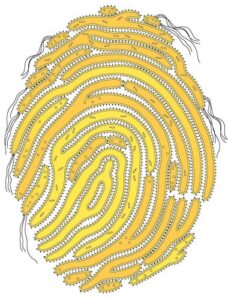Background:
Many studies on human microbiomes have demonstrated the great interpersonal variability of microbial communities, as well as the potential for specific aspects of the microbiome to uniquely tie to an individual. The significance of this study lies both in criminal forensic applications, as well as in privacy concerns for individuals that participate in microbiome research studies. Despite criminal forensic’s history of personal identification through fingerprints, DNA, and blood type, there have been no real efforts to establish microbial data as a method of personal identification.

The scientific community has already begun brainstorming how microbial data could be leveraged for forensic use. Using knowledge on how an individual’s microbiota changes depending on diet, lifestyle, medication, and pathology, forensic analysts may be able to trace suspects from their bacterial sheddings at a crime scene. Even without direct identification, the aforementioned lifestyle information could assist in apprehension of an assailant (Hampton-Marcell et al. 2017). This study’s purpose is to investigate the capabilities of “fingerprinting” individuals using their microbiome. Microbial fingerprinting (MF) will be defined as using a set of microbial data to trace and identify a unique individual from a larger population. The benefits of microbial fingerprinting in forensics would be numerous, allowing for suspect identification when human DNA is not usable. This pro to microbial fingerprinting comes from the resilience of bacterial DNA; it is not as easily destroyed as human DNA (Nema 2018). While researchers in the past have used metagenomic shotgun sequencing to identify microbial populations, they found that increases in data set size decreased efficacy for this profiling method. (Segata et al. 2012). For this reason, this study uses a method described in a publication from Segata et al. (2012), where clade-specific marker genes are used to identify microbial clades in larger data sets. Continue reading “Could Your Body’s Bacteria be the Reason You’re Proven Guilty of Murder?”
